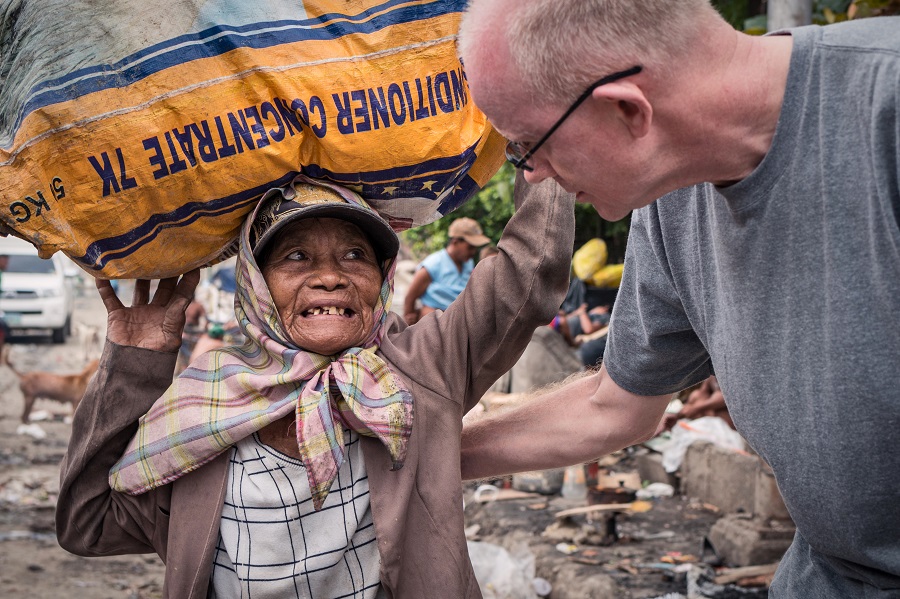At a Glance
- Showing mercy comes through meeting the physical and spiritual needs of others.
- Jesus exemplified showing mercy for us through his work on earth.
- Remembering times when you’ve been shown mercy can inspire you to be merciful to others.
- Pure mercy aims to avoid situations of dependency.
- We are all called to show mercy to others, whether or not we’re in full-time ministry roles.
In his life, Jesus exemplified the corporal works of mercy: to feed the hungry, to give drink to the thirsty, to clothe the naked, to welcome the stranger, to heal the sick, to visit the imprisoned and to bury the dead.
Since Jesus revealed the Father’s mercy to people, Christian communities have been witnessing the Father’s mercy in different cultures, times and places.
Do you remember the moments when YOU were the recipient of such mercy?
Moments of Mercy Are Unforgettable
Take a moment and try to remember how, what and from whom you received mercy in the past. I am sure you can remember many moments and the reasons why you remember them.
I am quite sure it is not because of the amount or kind of service you received, but because of the love, respect, sincerity, companionship, openness and other dimensions of human relationship that you experienced. I think this is the essence of witnessing and implementing the challenge of Jesus: “Be merciful, just as your Father is merciful” (Luke 6:36).
Showing Mercy as a Missionary
From the time of our foundation, Divine Word Missionaries have committed to the corporal works of mercy. Our founder, St. Arnold Janssen, introduced the custom of sending teams of missionaries to the houses of the poor to distribute whatever was needed and get to know their daily situation. And now, after 150 years of existence as a missionary congregation, we remain committed to carrying out the seven corporal works of mercy in many parts of the world.
Often, the acts of providing and receiving service create a strange, “dependent” relationship in which people become “providers” and “receivers.” These two sides form a relationship that remains and continues. Such a dependent situation makes it difficult for the receivers to become self-sufficient.
What Are Acts of Mercy?
In his papal bull Misericordiae Vultus, Pope Francis refers to the text of Isaiah 61:1-2 when he writes of the reasons to be merciful: “to proclaim liberty to those bound by new forms of slavery in modern society, to restore sight to those who can see no more because they are caught up in themselves, to restore dignity to all those from whom it has been robbed.”
What is important is liberating and bringing dignity to people who are in need, and service is a way to do that. When providing that service, it is critical to have a mutual and respectful relationship to avoid a situation of dependency. Also, it is important to encourage people to have hope for the future, which invokes the spiritual works of mercy.
As missionaries, we often say we work for the poor, the needy, the refugees, and so on. People have their own name, history, culture, hopes and many other specific details that define their unique lives. We should address people by their name. We need to understand their backgrounds and respect their sense of hope. We can provide a broad range of help, but often their needs do not match the kinds of assistance we offer. We need to be flexible, always respecting their hopes and their decisions and choices.
How to Show Mercy
One day, the Good Samaritan reached out to a man who was attacked by robbers (Luke 10:25-37). What do you think would have happened if the Good Samaritan had found 10people dying on the road when he traveled? In such a case, he would need other Good Samaritans to also reach out. And this is the reality that faces us daily in our current world.
We need more Good Samaritans!
But as Pope Francis says in Misericordiae Vultus, we can share the value of mercy together, work together and respect each other: “Consequently, wherever the Church is present, the mercy of the Father must be evident… Wherever there are Christians, everyone should find an oasis of mercy.”
The task to carry out the corporal works of mercy is not given only to specific missionaries or people. It is the work of every believer.
As our former superior general Father Heinz Kulüke SVD often says, “It is not only the poor who need us, but we also need the poor to experience God’s mercy.”
Let us continue working together to witness to the merciful Father.









